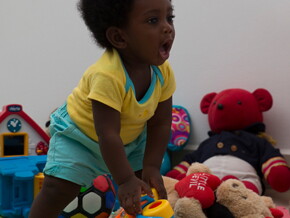
Baby Health - 12 to 24 months
Article
Allergies in Babies Due To Intolerance - Points to Consider
Jan 13, 2021
3 mins
An allergy is the reaction of our immune system to a substance it deems harmful. The violence of the reaction can vary considerably from person to person and may increase or decrease over time. Food intolerance can cause less severe reactions but may be more difficult to diagnose. Here are some tips:
- Be vigilant about key allergenic foods, such as cow's milk, nuts, legumes (including beans and other pulses), eggs, gluten, soy, fish and seafood.
- Keep in mind that these foods can be introduced around six months of age, as soon as you start giving your baby solid foods.
- Try to introduce allergenic foods one by one and in small amounts so that an allergic reaction can be spotted more easily.
- Once they have been introduced and are tolerated, try to include them in your child's usual diet, as this can minimize the risk of a future allergy.
- Do not delay the introduction of peanuts and eggs, as it has been shown to increase the risk of developing an allergy to these foods.
- Signs of allergies in babies may appear immediately after eating a food, or several hours after eating.
- Pay attention to the most common signs of allergy, such as swelling of the lips or tongue, wheezing or difficulty breathing, itching of the skin, throat, tongue or eyes, rashes or hives, coughing, diarrhea, vomiting and runny nose.
- A severe allergic reaction or anaphylaxis is severe, so it is important to know how to manage it.
- If you think your baby is allergizing, stay calm and seek medical help as soon as you understand that something is wrong.
- If your child shows signs of a severe allergic reaction or anaphylaxis, call emergency services immediately.
- If your child has a food allergy, talk to the doctor who follows him, be sure to read the food labels carefully and avoid any food whose ingredients are not clear.
- Food intolerance is not a reaction of the immune system. These are usually difficulties in digesting a food.
- Remember that signs of intolerance in babies can appear more slowly, making them more difficult to diagnose. Learn how to detect lactose intolerance in babies.
- Be alert for signs of intolerance, such as stomach cramps, diarrhea and bloating.
- The best thing to do if you are concerned that your baby may have an allergy or food intolerance is to talk to your GP.

















